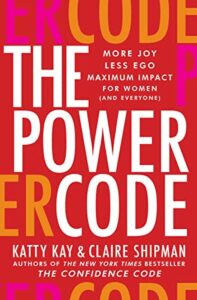 If, like me, you’re interested in how power works, especially for yourself, make sure to keep up with the latest studies. That was my ah-ha after reading this new book, The Power Code: More Joy, Less Ego, Maximum Impact for Women (and Everyone Else). It features new evidence-based research that tells a new, alternative story about power, namely that women look at and use power differently than men do.
If, like me, you’re interested in how power works, especially for yourself, make sure to keep up with the latest studies. That was my ah-ha after reading this new book, The Power Code: More Joy, Less Ego, Maximum Impact for Women (and Everyone Else). It features new evidence-based research that tells a new, alternative story about power, namely that women look at and use power differently than men do.
The book’s authors, the established journalists Katty Kay and Claire Shipman, who also wrote the best seller The Confidence Code and its spinoffs, explain this new research in detail and bring it to life.
The powerhouse author duo interviewed dozens of women of all ages, races, and backgrounds around the world, as well as cutting-edge academic researchers (male and female) for their perspectives on power for the book. The book also includes the authors’ relevant life experiences and explains your brain on power, which has important implications for both men and women, which I confirm based on my neuroscience studies and experiences. And just as valuable, the authors provide practical tips, a la “Your Power Code,” at the end of each chapter to make the content more actionable.
My three big takeaways from reading the book:
- More women academics are now researching power, which is how and why we’re gaining more insights about power and different ways it functions. In other words, it’s more than “what gets measured, gets managed” as the esteemed management professor guru Peter Drucker once said. It’s also “who’s doing the research affects what questions get asked and answered.” (More on this later.)
- Women prefer having “power to” rather than “power over” because “power to” implies purpose and respect. And when you’re focused on “power to,” you can share power; you don’t see it as a zero-sum game in which one has to lose in order for the other to win, as many men view power.
- For many women, primarily those in heterosexual relationships, the biggest barriers to getting and sharing power are often their husbands, not their bosses. The power struggles and power imbalances are often related to the division of labor in the home.
Even if women and men share the shopping, cooking, cleaning, and caring for the children, there’s a whole other component–the planning and execution involved in running the household. This “cognitive labor,” which is generally invisible yet significant, often falls on women’s shoulders.
The researchers studying this phenomenon point out it’s not just cognitive labor; it’s cognitive load. If you’re taking on this heavy role, you’ve got to anticipate what the household will need, such as upcoming childcare, then identify the options, and decide what to do, maybe with your partner. Then you need to monitor the situation, and if needed, adjust. For those who believe power is time, including control of our time, individuals who are contributing time to provide the cognitive labor–generally women—find themselves in an inequitable position. Being more aware is the first step to deciding how to manage this role.
The last memorable book I read about power was the 2018 also ground-breaking and well-researched book, New Power: How Power Works in Our Hyperconnected World—and How to Make It Work for You. Authors Jeremy Heimans and Henry Timms (also the co-founder of #GivingTuesday) defined “new power” as open, participatory and peer driven. In other words, it’s a current that many make.
By contrast, they said “old power” works more like a currency. Those in power, or those who seize it, jealously guard it, and aim to make others comply with their orders. (And today in the U.S. lots of people in power are fearful of losing their positional power. Many, especially in legislative, judicial, and political roles, are not only guarding their power, but they’re also trying to grab more. No wonder so many women, including me, are supporting bans off our bodies.)
During the summer of 2018, when I blogged about 3 new power skills that make you a better leader introduced in the New Power book, I remember feeling compelled to use specific examples to describe the new skills of signaling, structuring, and shaping. I featured my client Planned Parenthood Federation of America and its political and advocacy arm, Planned Parenthood Action Fund. Why? Almost all of New Power ‘s stories featured men, except for Alicia Garza, Ayọ Tometi, and Patrisse Cullors who co-founded Black Lives Matter.
Fast forward these five years to 2023, The Power Code book has the benefit of accomplished, thoughtful, and nuanced female authors describing new research. And the two authors do even more. They define power in a new way – “the ability to exercise one’s will, to influence others, to effect change” based on “power to.” They also offer a new three-part code for power:
- “The ability to exercise our will – more joy”
- “Influencing (not controlling) others – less ego”
- “Effecting change – maximum impact.”
This power code is exciting to support. Are you ready to join me?

0 Comments